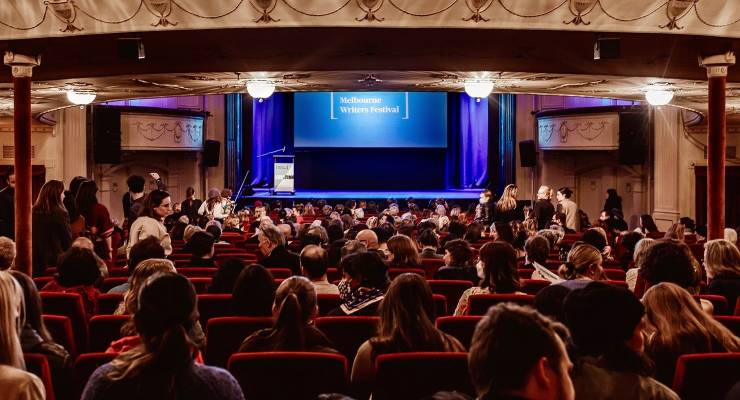
Australia’s bookish are being asked to take a stand on something besides Gerald Murnane, and it’s causing conniptions.
Last week came the news that State Library Victoria had cancelled a series of free writing boot camps for teens (think fiction/nonfiction/playwriting/poetry) citing “child and cultural safety” in a time of “heightened sensitivities.” The workshops were pulled from the program suddenly, in the case of poet Omar Sakr, just 24 hours before the course he had prepared was meant to kick off.
Then late last month at the Perth Festival Writers Weekend, people gathered to protest outside the festival’s headlining event: a conversation with Australian musician Deborah Conway. Conway had appeared on ABC RN’s Breakfast in December, where in response to being asked by host Patricia Karvelas about the disproportionate number of children casualties, “We know they’re not Hamas, right?”, Conway responded, after a brief pause, “It depends on what you call kids.” She continued: “But, young people, 16-, 17-year-old young boys toting rifles. I’ve seen plenty of photos of that stuff, that unfortunately they, Hamas, recruits, um, boys that are not men yet.”
The protests were the culmination of months of outrage and demands for the programmers of Writing WA to cancel the event and apologise for platforming Conway to begin with (she has since qualified her comments). Five hundred writers and arts workers signed an open letter criticising Writing WA’s decision to feature Conway, stating: “The programming of Deborah Conway risks the safety of the festival and platforms beliefs that should be comprehensively rejected. Conway’s recent comments on ABC Radio … seek to normalise the ongoing genocide enacted by the state of Israel against the Palestinian people”.
In response, Writing WA allowed the event to go ahead with tightened security, and a warning to festival moderators to steer away from controversial topics/avoid cranks. Tips cooked up by Writing WA and the State Library included identifying “off-limits” topics with panellists in advance, coming up with physical signals for panellists to communicate any discomfort and ditching audience questions if they were set to become too dicey.
Days after Conway’s talk, deputy chair of Melbourne Writers Festival, Leslie Reti, resigned in opposition to the description of a poetry event in the festival’s (yet to be published) program. It read: “Aboriginal and Palestinian solidarity has a long history, a relationship that is more vital than ever in the moment to resist colonialism and speak out against atrocities.”
The session is curated by a “self-determined First Nations programmer” (Mykaela Saunders) and is focussed on the link between Palestinian and Aboriginal communities, two colonised groups, one of which is currently under sustained military assault. Reti described the event description to The Age as “historically untrue and deeply offensive.”
These are just a few blips on what is becoming an industry-wide fight.
Ever since Hamas’ October 7 attack and Israel’s subsequent assault in Gaza, there has been an explosion of cataclysmic rifts and splits within Australia’s hobbling arts sector, particularly in the dark little corner referred to, tragi-comically, as “OzLit.”
Used to blacklisting each other over perceived slights that may or may not have occurred at a sparsely attended poetry launch decades prior, Australian writers, publishers, and their curatorial/managerial hangers-on are suddenly grappling with an issue of real importance, and many (and this may be a relief for some) are seemingly lost for words.
This shouldn’t surprise anyone familiar with the politics of the Australian book business, or, in reality, its lack thereof. But it’s also unsurprising in the context of the very real reprisals against vocally pro-Palestinian artists.
People are undeniably vulnerable to cancellation and de-platforming, and it is noticeably taking place in almost every corner of the business. But despite what our conservative media would have you believe, the only people being deplatformed, shunned, and threatened are the pro-Palestinian voices defying an industry that’s proud of its carefully curated indifference.
The “doxxed” WhatsApp group that Conway was an active member of functioned in part to root out these pro-Palestinian voices from the industry. Artists like Evelyn Araluen and Jonathan Dunk, the editors of Overland, have spent months fending off a vicious and virulently defamatory campaign to get them fired over their politics.
The poet Omar Sakr says he had lost work prior to the State Library pulling his contract and faces ongoing racist harassment over his outspoken defence of Palestinian people and their rights, as well as his criticisms of Israel. Louise Adler threw the gauntlet down at the Adelaide Writers Festival and has had to spend months fighting off attempts to delegitimise her, her decision and her work as a consequence of taking a stand. Most recently, she’s weighed in after “…a few attendees have been aggrieved by the absence of a ‘pro-Israel’ speaker…”
The centrist-minded fence-sitters who run OzLit and the creative sector do not know what to do in the face of these types of attacks, which some pleadingly believe would disappear via “healthy debate” or the end of that devil’s fleshlight, social media.
Literary journal Meanjin Quarterly, for example, recently faced backlash for an editorial published online that outlined the publication’s stance on Israel’s actions in Gaza. Reader responses criticised it as “both-sides middling nonsense”. Meanjin has since updated it.
This Chamberlain-style inability to comprehend (let alone deal with) what is going on speaks to a larger split in the OzLit/creative sector in Australia, one that comes down to the material conditions of working in the arts in Australia today.
One of the easiest divides to trace in OzLit is between what I’ll call “working writers” and “the landed gentry”. Working writers are the underclass of the writing industry and tend to be those artists (writers, editors, publishers etc) toiling away, attempting to stitch something together for what amounts to an hourly rate of $2.46, if you strike gold.
The landed gentry are the writers who have passed on into being brands in their own right, the publishers who are that and that alone, and the prizes, publications, bodies, funds, grants, boards, houses, trustees, directors, donors, and, (most importantly) festivals who keep the whole racket running along, semi-smoothly.
The industry’s insistence on art and artists that are smoothed down and “relatable” is as self-defeating as it is cowardly. But where there is no courage, there is no courageous art, and you can feel/read this cowardice seeping into Australian books, which is sliding into an all-consuming pool of Dymocks-friendly content goop: books destined to be adapted into Stan Originals, with the shelf life of bananas in a house fire.
So OzLit contains this ever-present friction between a group that desires to tackle, provoke, and invent friction, and a group that desires to exploit it while maintaining a wholly frictionless existence (lest it affect sales). Both are as co-dependent as a 40-something honours supervisor and their 24-year-old student/partner, so there remains an uneasy, if contentious, truce.
But the genocide in Gaza has made this truce impossible to maintain.
There’s a very real fear that these marginal, radical, and bold voices will be shoved out for good, a move that Australian literature — with its popular reputation of being as exciting as Xavier Herbert’s hemorrhoids — can not afford.
Clarification: This article has been amended to include a longer quote from Deborah Conway’s remarks during her Radio National interview.








Crikey encourages robust conversations on our website. However, we’re a small team, so sometimes we have to reluctantly turn comments off due to legal risk. Thanks for your understanding and in the meantime, have a read of our moderation guidelines.